As devoted pet parents, it’s natural to want to share everything with our furry companions, including our favorite human snacks. However, when it comes to deciding What Fruits Can Dogs Have And Not Have, the answer isn’t always straightforward. While a piece of fruit might be a healthy treat for you, your dog’s digestive system operates differently, and certain human foods can lead to serious health issues, or even be outright toxic. Understanding these distinctions is crucial for your dog’s well-being.
Dogs are omnivores and, strictly speaking, don’t require fruits or vegetables as a core part of their diet. Nevertheless, many dog-safe fruits and vegetables can serve as excellent, healthy treats or occasional snacks, offering a boost of vitamins, minerals, and antioxidants. These natural additions can enhance their diet and provide enjoyable enrichment. This comprehensive guide will walk you through which fruits and vegetables are safe to share in moderation and which should be strictly avoided to ensure your canine companion stays healthy and happy.
Fruits Dogs Can Enjoy Safely
When given in moderation and prepared correctly, several fruits can be delicious and beneficial additions to your dog’s treat repertoire. These options offer a natural source of essential nutrients.
Apples
Apples are a fantastic source of vitamins A and C, along with dietary fiber, making them an excellent snack for dogs. Their low protein and fat content make them particularly suitable for [senior dogs](https://dogcarestory.com/what-foods-can you-feed-your-dog/). Always remove the seeds and core before offering apples, as apple seeds contain trace amounts of cyanide. For a refreshing treat, try freezing apple slices. You can also find apple as an ingredient in many commercially available dog treats.
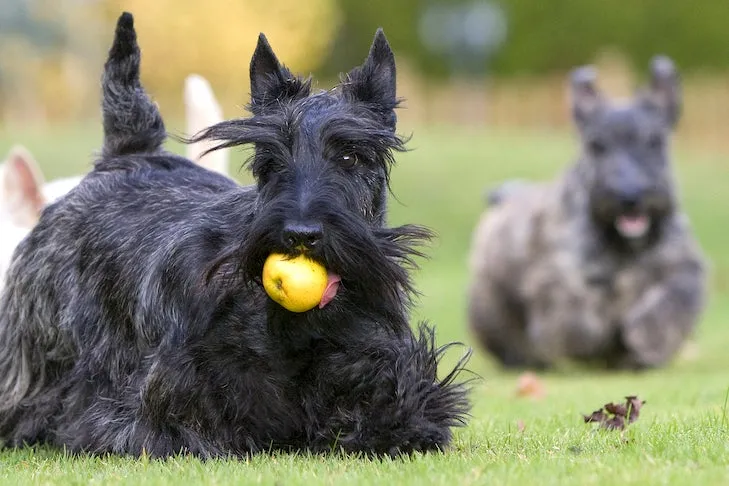 A close-up of a Scottish Terrier puppy playing in vibrant green grass.
A close-up of a Scottish Terrier puppy playing in vibrant green grass.
Bananas
Bananas offer a great low-calorie treat option for dogs when given sparingly. They are rich in potassium, vitamins, biotin, fiber, and copper, while being low in cholesterol and sodium. However, due to their high sugar content, bananas should be reserved as an occasional treat rather than a staple in your dog’s diet. Consider offering small slices or incorporating them into frozen dog treats.
Blueberries
Often considered a superfood, blueberries are packed with antioxidants that help prevent cell damage in both humans and canines. They also provide fiber and phytochemicals. Blueberries are small and easy for dogs to eat, making them a fun reward, especially if you’re teaching your dog to catch treats. Many dog treats also feature blueberries, sometimes combined with other beneficial ingredients like yogurt.
Cantaloupe
This juicy melon is loaded with nutrients, low in calories, and an excellent source of water and fiber. Its hydrating properties make it a refreshing treat, especially during warmer months. However, cantaloupe is high in sugar, so it should be given in moderation, particularly to dogs who are overweight or have conditions like diabetes. Freezing small cubes of cantaloupe can create an enjoyable and cooling enrichment snack for your dog.
Cranberries
Both fresh and dried cranberries are safe for dogs in small quantities, although their tart taste might not appeal to all canines. Moderation is key, as overconsumption can lead to an upset stomach. It’s important to note that many dried cranberries sold for human consumption are sweetened, adding unnecessary sugar to your dog’s diet. Opt for unsweetened fresh or frozen cranberries, or choose crunchy cranberry-infused dog treats if your dog enjoys the flavor.
Cucumbers
Cucumbers are an excellent choice for dogs, particularly those who are overweight, as they contain very few carbohydrates or fats and are primarily composed of water, offering great hydration. They are rich in vitamins K, C, and B1, as well as potassium, copper, magnesium, and biotin. Cool cucumber slices make a superb hot-weather treat, and frozen slices can provide a stimulating enrichment activity.
 A Russell Terrier with a funny expression, balancing cucumber slices on its head and snout.
A Russell Terrier with a funny expression, balancing cucumber slices on its head and snout.
Mango
This sweet, tropical fruit is a powerhouse of vitamins A, B6, C, and E, in addition to potassium, beta-carotene, and alpha-carotene. When offering mango, always remember to remove the hard pit first. The pit contains small amounts of cyanide and poses a significant choking hazard. Due to its high sugar content, mango should be given as an occasional treat, especially for dogs prone to weight gain. For a less messy option, consider chewy mango dog treats that offer similar nutritional benefits.
Oranges
Veterinarians generally consider oranges safe for dogs, though some dogs may be deterred by their strong citrus scent or taste. Oranges are an excellent source of vitamin C, potassium, and fiber. In small quantities, the juicy flesh can be a tasty treat. It’s recommended to peel the orange and remove any seeds, as the peel can be rough on a dog’s digestive system, and its oils may be off-putting. If your dog isn’t keen on fresh oranges, there are dog treats that incorporate orange flavor.
Peaches
Small, cut-up pieces of fresh or frozen peaches can be a good source of fiber and vitamin A for dogs. Similar to cherries, peach pits contain cyanide and must be completely removed and safely discarded to prevent ingestion and choking. Always ensure the flesh is cut away from the pit entirely. Avoid canned peaches, which are often packed in sugary syrups. Even those labeled “in natural juice” typically contain more sugar than a dog needs. Frozen peach slices can be a fun, cooling treat.
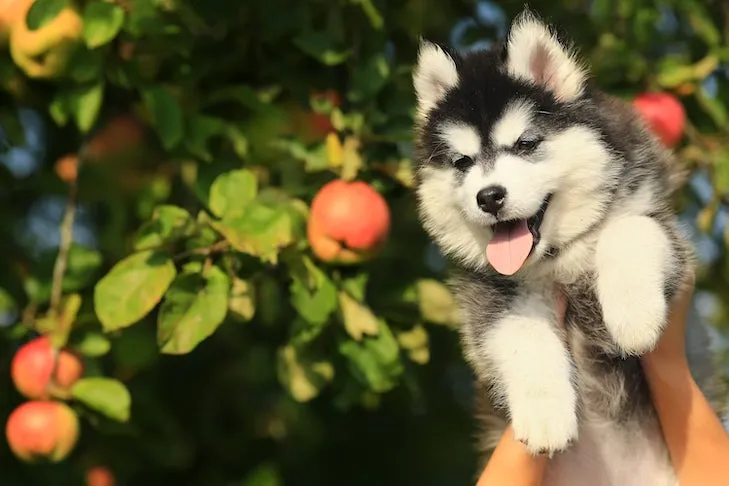 A Siberian Husky puppy being gently held up to an apple tree, looking curious.
A Siberian Husky puppy being gently held up to an apple tree, looking curious.
Pears
Pears are a beneficial snack for dogs, being rich in copper, vitamins C and K, and fiber. When sharing pears, make sure to cut the flesh into bite-sized chunks and remove the core and seeds, as pear seeds also contain traces of cyanide. As with peaches, avoid canned or jarred pears with added sugary syrups. You can also find dog treats that feature pear along with other functional ingredients like duck or salmon.
Pineapple
A few chunks of pineapple can be a sweet and delightful treat for dogs, provided the prickly outer peel and crown are thoroughly removed. This tropical fruit is abundant in vitamins, minerals, and fiber. It also contains bromelain, an enzyme that aids dogs in absorbing proteins. As with other fruits, do not choose canned or packaged pineapple preserved in sweetened syrups, as dogs do not need added sugars in their diet, especially if they are prone to obesity. Pineapple dog treats are also available for a convenient tropical snack.
Pumpkin
Pure pumpkin is a highly beneficial food for dogs. It’s loaded with antioxidants, and its standout property is its ability to help relieve both diarrhea and constipation. If you’re using canned pumpkin, always choose 100% pumpkin puree, avoiding pumpkin pie filling which contains spices and sugar. Alternatively, you can roast pumpkin yourself and feed your dog the peeled, cooked flesh. Numerous pumpkin supplements and dog treats are also available.
Raspberries
Raspberries are safe for dogs in moderation and contain antioxidants beneficial for their health. They are low in sugar and calories but high in fiber, manganese, and vitamin C. Raspberries are particularly good for what foods can a dog have and senior dogs due to their anti-inflammatory properties, which can help support aging joints. It’s important to note that raspberries contain small, naturally occurring amounts of xylitol, so limit your dog to no more than 8 ounces of fresh or frozen raspberries. Dog treats that include raspberry as an ingredient are another good option.
Strawberries
Strawberries are rich in fiber and vitamin C, and they also contain an enzyme that can help whiten your dog’s teeth. Like all fruits, strawberries contain natural sugars, so offer them in moderation. Frozen strawberries can be a fun enrichment treat for dogs. For a playful alternative, you could hide your dog’s favorite strawberry training treats in a strawberry-shaped snuffle mat.
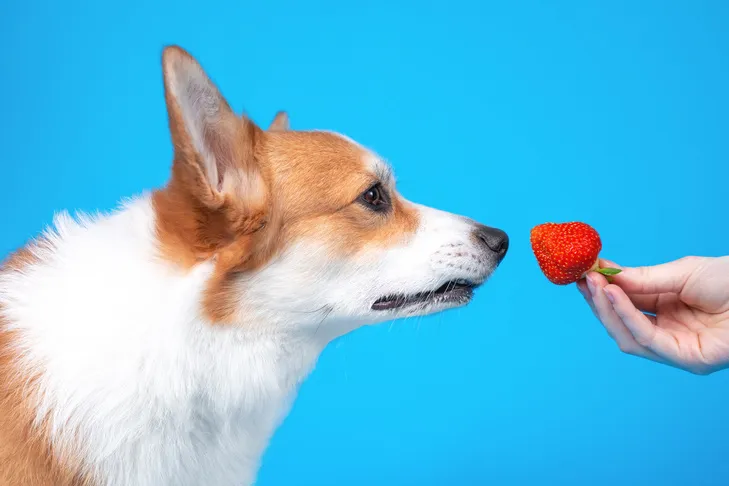 A Pembroke Welsh Corgi sniffing curiously at a vibrant red strawberry on a blue background.
A Pembroke Welsh Corgi sniffing curiously at a vibrant red strawberry on a blue background.
Watermelon
Dogs can safely eat watermelon, but it is crucial to remove the rind and seeds first, as these parts can cause intestinal blockages. The watermelon flesh itself is safe and beneficial, packed with vitamins A, B-6, and C, as well as potassium. Comprising 92% water, watermelon is an excellent way to keep your dog hydrated, especially on hot summer days. Freezing chunks of seeded watermelon makes for a great hot-weather enrichment treat. Watermelon-flavored dog treats are also available.
Fruits Dogs Should Absolutely Avoid
While many fruits are healthy for humans, some contain compounds, seeds, or parts that are dangerous, or even toxic, for dogs. It’s paramount to keep these fruits out of your dog’s reach for their safety.
Avocado
Although avocado is a healthy snack for humans, it should not be given to dogs. The pit, skin, and leaves of avocados contain persin, a toxin that frequently causes vomiting and diarrhea in dogs. While the fleshy inside of the fruit has less persin, it can still be too much for a dog’s system. Additionally, avocado flesh is high in fat, which can lead to gastrointestinal upset or contribute to serious conditions like pancreatitis if consumed in large quantities. However, your dog can still benefit from avocado’s properties if you choose dog treats for skin and coat health that include avocado as an ingredient.
Cherries
With the exception of the fleshy fruit around the seed, all parts of the cherry plant, including the leaves, stems, and especially the pits, contain cyanide and are toxic to dogs. Cyanide disrupts cellular oxygen transport, meaning your dog’s blood cells cannot get enough oxygen. If you have a cherry tree, ensure your dog doesn’t have access to fallen fruit. Symptoms of cyanide poisoning, such as dilated pupils, difficulty breathing, and red gums, require immediate veterinary attention. When you enjoy cherries, dispose of the pits securely in a dog-proof trash can. Consider cherry-flavored dog treats for a safe way for your dog to experience the antioxidant benefits.
Grapes
If you suspect your dog has eaten grapes or raisins, contact your veterinarian immediately. Grapes and raisins are highly toxic to dogs, regardless of breed, sex, or age. Their toxicity can lead to acute sudden kidney failure. Always be extremely vigilant about this dangerous fruit around dogs, especially if children in your home eat grapes or raisins. Dispose of grapes and raisins in a secure, dog-proof trash bin, never in a compost heap accessible to pets.
Tomatoes
While the ripened red flesh of a tomato fruit is generally considered safe for dogs, the green parts of the tomato plant—stems, leaves, and unripe green tomatoes—contain a toxic substance called solanine. A dog would need to consume a significant amount of the plant material to become sick, but it’s generally safer to avoid feeding tomatoes altogether. If your dog enjoys exploring the garden, take measures to prevent them from accessing your tomato plants.
 A Rottweiler laying peacefully in a grassy yard, its head tilted slightly, observing its surroundings.
A Rottweiler laying peacefully in a grassy yard, its head tilted slightly, observing its surroundings.
Vegetables Dogs Can Enjoy Safely
Understanding which vegetables are safe for your dog is just as important as knowing about fruits. Many vegetables offer valuable nutritional benefits for dogs and can make excellent additions to their diet.
Broccoli
Broccoli can be safe for dogs in small amounts and is best served as an occasional treat. It’s high in fiber and vitamin C and low in fat. However, broccoli florets contain isothiocyanates, which can cause mild to potentially severe gastric irritation in some dogs if consumed in large quantities. Tough broccoli stalks have also been known to cause esophageal obstructions. To mitigate these issues, it’s better to offer cooked broccoli. Alternatively, let them enjoy a broccoli-shaped dog chew toy while you enjoy your meal.
Brussels Sprouts
Brussels sprouts are packed with beneficial nutrients and antioxidants for both humans and dogs. However, they should be given in moderation, as overfeeding can lead to significant gas in your dog. If your dog genuinely enjoys Brussels sprouts and you can tolerate the digestive side effects, you might consider dehydrated dog foods that include these leafy greens as an ingredient.
Carrots
Carrots are an outstanding low-calorie snack, high in fiber and beta-carotene, which is converted into vitamin A in the body. Furthermore, the act of crunching on this orange root vegetable is excellent for your dog’s dental health. Carrots are a common ingredient in many dog foods and a popular choice for various what human food can my dog eat and dog treats.
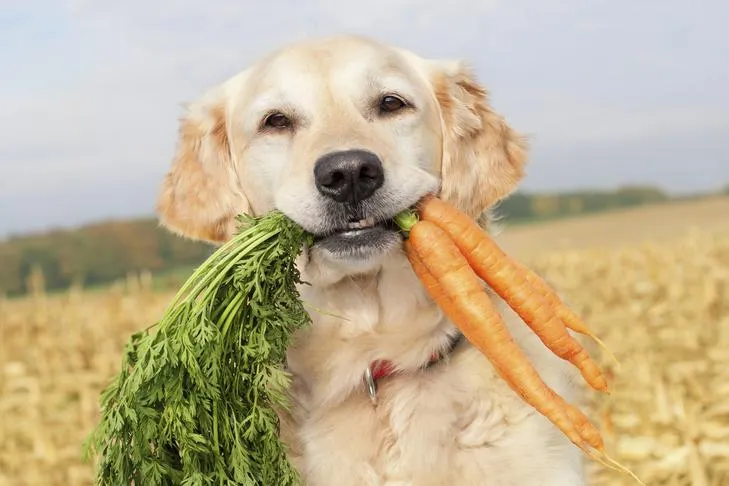 A Golden Retriever gently holding several carrots in its mouth, looking happy.
A Golden Retriever gently holding several carrots in its mouth, looking happy.
Celery
Beyond providing vitamins A, B, and C, celery contains nutrients that can promote heart health and potentially help fight cancer. An added bonus is that celery is known to help freshen a dog’s breath. You can find celery dog chews as an enjoyable option for many dogs.
Green Beans
Whether chopped, steamed, raw, or canned (plain), green beans are safe for dogs to eat. They are rich in important vitamins and minerals, full of fiber, and low in calories. When choosing canned green beans, opt for no-salt-added varieties. Frozen green beans can also serve as fun enrichment snacks, especially in warmer weather.
Peas
Green peas, snow peas, sugar snap peas, and garden or English peas are all acceptable for dogs to eat occasionally. Peas are a good source of several vitamins, minerals, protein, and are high in fiber. You can feed your dog fresh or frozen peas, but always avoid canned peas that have added sodium.
Spinach
Dogs can consume spinach, but it’s not among the top recommended vegetables to share with them. Spinach is high in oxalic acid, which can interfere with the body’s ability to absorb calcium and potentially lead to kidney damage. While a dog would likely need to eat a very large amount of spinach for this to be a problem, it might be safer to choose other vegetables. If you wish for your dog to benefit from this leafy green, spinach dog treats are available as an occasional snack.
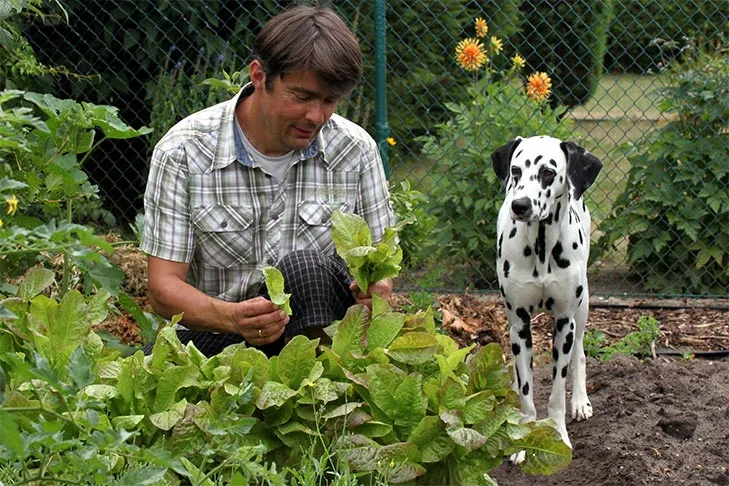 A Dalmatian dog attentively watching a man gardening and picking leaves from a plant.
A Dalmatian dog attentively watching a man gardening and picking leaves from a plant.
Vegetables Dogs Should Absolutely Avoid
While many vegetables contribute to a healthy diet, some are toxic or harmful for dogs to consume and should never make their way into your dog’s bowl. what foods can you feed your dog requires careful consideration.
Asparagus
While asparagus isn’t inherently unsafe for dogs, there’s little nutritional benefit to feeding it to them. It’s too tough to be eaten raw, and by the time it’s cooked to a soft enough consistency for dogs, much of its nutritional value is lost. If you’re looking to share a vegetable with your dog, there are many other options that offer greater advantages and are more palatable.
Mushrooms
Wild mushrooms can be extremely toxic to dogs. Although only a small percentage of the vast number of mushroom species worldwide are poisonous, those that are can cause severe illness or even death. Therefore, foraging for mushrooms is always a solid “no.” Washed mushrooms purchased from a supermarket for human consumption are generally fine for dogs in small amounts, but due to the high risk associated with wild varieties, many veterinarians advise avoiding mushrooms altogether.
Onions
Dogs should never eat onions, or related vegetables like leeks and chives. These belong to the Allium family of plants, which is poisonous to most pets, particularly cats. Ingesting onions can cause your dog’s red blood cells to rupture, leading to symptoms like vomiting, diarrhea, stomach pain, and nausea. Onion poisoning is especially serious in Japanese breeds such as Akitas and Shiba Inus, but all dogs are highly susceptible. Ensure children do not share onion-containing foods with your dog, and secure leftovers where your dog cannot access them. For more details on safe foods, see our article on what vegetables are not safe for dogs.
Navigating the world of human foods for your canine companion can seem daunting, but armed with the right information, you can make informed decisions that safeguard their health. Knowing what fruits can dogs have and not have, alongside safe and unsafe vegetables, is an essential part of responsible pet ownership. Always remember that while many of these foods offer nutritional benefits, they should be given as occasional treats and never replace a balanced commercial dog food diet. If you have any concerns about your dog’s diet, or if they accidentally consume a toxic food, always consult your veterinarian immediately. For dogs with specific health needs, such as diabetes, it’s crucial to know what human food can a diabetic dog eat. By being mindful and proactive, you ensure your beloved pet enjoys a safe, healthy, and happy life.
